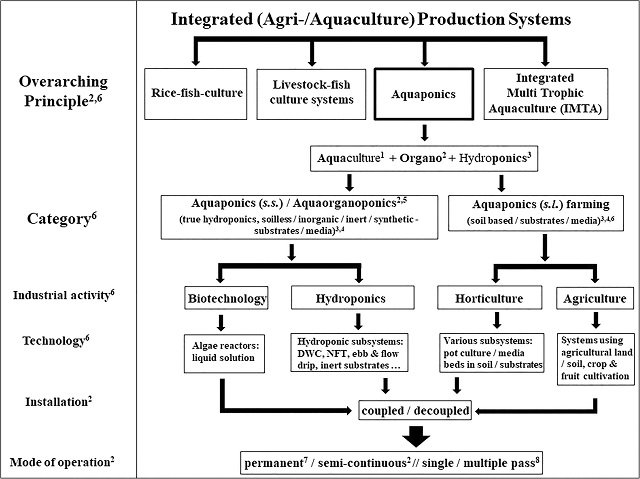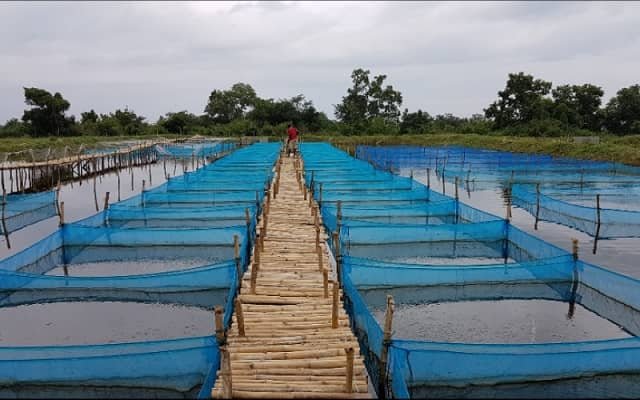
Food production has undergone significant evolution in recent decades, and in particular, the food production system known as “aquaponics” has come a long way from its origins in the 1970s and 1980s.
An article published by researchers from the University of Rostock and the University of Greenwich suggests that the fundamental principle of aquaponics should be the defining element of what aquaponics truly is, and from there, everything else aligns according to specific systems and technologies.
Furthermore, the researchers support the position of other researchers that aquaponics should maintain a nutrient supply threshold (>50%) from feeding through aquatic organisms to plants.
Debating New Definitions
According to the study’s authors, “The definition is exceptionally crucial for producers who need to ensure that their products are correctly identified, reach the desired market, provide a ‘level playing field’ for producers, and achieve prices that respond to production principles and methods.”
In the quest for an accurate definition for aquaponics, alternatives have recently been proposed that, in the opinion of the article’s authors, unnecessarily complicate existing definitions and nomenclature.
“We have always known that aquaponics is an unfortunate and inappropriate name since the term does not adequately describe what it is. It is well-cited that the terms aquaculture and hydroponics have been joined to form the word aquaponics, but the link to hydroponics is very unfortunate,” emphasize the authors.
They argue that any new definition should reference established terms and must be rigorously tested before acceptance. The article adheres to the definition supported by Palm et al., as it maintains the essential simplicity and clarity required to understand aquaponics as a concept.
The Importance of the Principle in Aquaponics
It is emphasized that the fundamental principle of aquaponics is the key element that should define the practice itself. This principle involves the transfer of natural organic compounds, along with microorganisms, in water from the aquaculture unit to plants.
It is this central characteristic that sets aquaponics apart from other food production systems and should be preserved in any definition.
Stay Always Informed
Join our communities to instantly receive the most important news, reports, and analysis from the aquaculture industry.
Beyond “Coupling”
While “coupling” is an important aspect in aquaponics production, this article argues that aquaponics is, in reality, a much more complex system that involves various technologies and concepts. While coupling is integral, it is not the sole defining feature of aquaponics. The discipline encompasses a wide range of technologies and practices that go beyond simply connecting components.
Introducing an Alternative Term: Aquaorganoponics
Given the idiosyncrasies of the term “aquaponics,” the study’s authors suggest the adoption of a new term: “aquaorganoponics.”
This term more accurately reflects the fundamental principles of aquaponics, which involve the transfer (“ponics”) of natural organic nutrients (“organ”) through water from aquaculture (“aqua”) to plants. The new designation removes the association with hydroponics, which primarily uses artificial fertilizers, and emphasizes the organic and sustainable nature of the practice.
According to the researchers, “aquaponic systems can be clearly distinguished from hydroponic systems, as they underlie completely different biological processes and therefore require their own technological adaptations.”
Conclusions
This article contends that the central principle of aquaponics should be the defining factor, and that existing definitions are sufficiently clear and straightforward. Additionally, it highlights that aquaponics is a complex system that goes beyond mere “coupling” and proposes the term “aquaorganoponics” as a more precise and representative alternative.
“We suggest that future aquaponic terms, before being published and added to the literature, should follow standard scientific procedures already implemented, in that (1) existing terms from other disciplines or related disciplines, if transferable, should take precedence (priority of publication* is a basic principle), (2) meanings of already published terms should be appropriately changed, and (3) the accuracy and consistency of terms should be tested,” conclude the researchers.
Ultimately, the review and clarification of terminology in aquaponics are essential to promote accurate understanding and advance sustainable food production.
The study was funded by the Ministry for Climate Protection, Agriculture, Rural Areas, and the Environment of Mecklenburg-Western Pomerania (Germany) and the European Union. Additionally, the study was carried out with the financial support of the project “Performance and process water management in commercial (integrated) aquaculture systems with African catfish (Clarias gariepinus) in Mecklenburg-Western Pomerania,” from Deutsche Forschungsgemeinschaft and the University of Rostock.
Contact
Harry W. Palm
Professor of Aquaculture and Sea-Ranching
Faculty of Agricultural and Environmental Sciences, University of Rostock
Justus-von-Liebig-Weg 6, Rostock D-18059, Germany.
Email: harry.palm@uni-rostock.de
Reference (open access)
Palm, HW, Knaus, U, Kotzen, B. Aquaponics nomenclature matters: It is about principles and technologies and not as much about coupling. Rev Aquac. 2023; 1-18. doi:10.1111/raq.12847
Editor at the digital magazine AquaHoy. He holds a degree in Aquaculture Biology from the National University of Santa (UNS) and a Master’s degree in Science and Innovation Management from the Polytechnic University of Valencia, with postgraduate diplomas in Business Innovation and Innovation Management. He possesses extensive experience in the aquaculture and fisheries sector, having led the Fisheries Innovation Unit of the National Program for Innovation in Fisheries and Aquaculture (PNIPA). He has served as a senior consultant in technology watch, an innovation project formulator and advisor, and a lecturer at UNS. He is a member of the Peruvian College of Biologists and was recognized by the World Aquaculture Society (WAS) in 2016 for his contribution to aquaculture.







